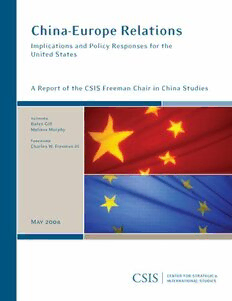
China-Europe Relations: Implications and Policy Responses for the United States PDF
61 Pages·2008·1.093 MB·English
Most books are stored in the elastic cloud where traffic is expensive. For this reason, we have a limit on daily download.
Preview China-Europe Relations: Implications and Policy Responses for the United States
Description:
Today, as China's influence in the world grows and as the European Union moves to strengthen its position in international affairs, it is all the more critical for U.S. policy leaders to take careful stock of China-Europe relations and their implications for U.S. interests. Europe-China relations have become increasingly regularized, institutionalized, and mutually beneficial, encompassing a broadening range of political, economic, military, scientific, technological, educational, and cultural ties. The China question has arisen as an area of potential transatlantic disagreement, especially over the arm embargo issue, but also on broader concerns of global order, multipolarity, balancing U.S. power, and economic competition. Given the political, economic and security-related importance of China and Europe to the United States, improving China-Europe relations pose important challenges and opportunities for U.S. interests. These developments may not only challenge the U.S. position vis-a-vis China and Europe; they also could contribute to an increasingly competitive, confrontational, and ultimately detrimental deterioration in traditionally strong transatlantic relations, while also further exacerbating persistent mistrust in U.S.-China ties. Were U.S.-Europe-China relations to deteriorate, Washington could lose out on the enormous strategic opportunities that would encourage positive political, economic, and security-related outcomes in China, which favor U.S., European, and Chinese interests over the longer term. Key questions need to be addressed. What are the most important drivers and developments in contemporary China-Europe relations? Will rapidly developing China-Europe relations drive a strategic wedge into transatlantic relations? Will intensifying China-Europe relations result in closer Sino-European ties, damaged U.S. strategic interests, and diminished transatlantic relations? What needs to happen in the United States, in Europe, and in transatlantic relations to avoid or alleviate a strategic rift over China? Do the United States and Europe share more common interests and values vis-a-vis China than differences? How can the United States and Europe achieve complementarity and bring their respective strengths to bear in their approaches to China? This study seeks to explore and provide answers to these questions, thereby helping policymakers improve their understanding of China-Europe relations and broaden transatlantic common ground regarding China s growing influence in the world.
See more
The list of books you might like
Most books are stored in the elastic cloud where traffic is expensive. For this reason, we have a limit on daily download.
